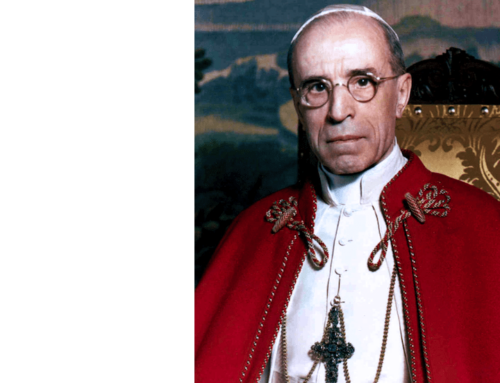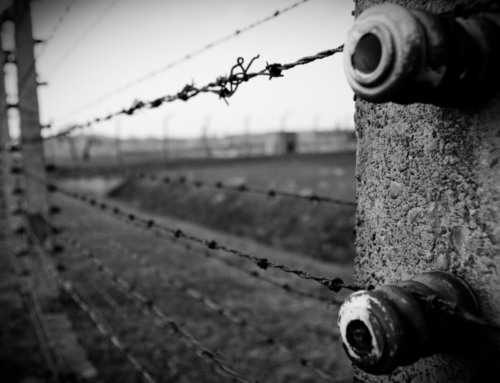| Sister Margherita Marchione
Catalyst, June 1998 With the issuance of the Vatican document, “We Remember: A Reflection on the Shoah,” voices adversely judging Pope Pius XII’s alleged “silence” have increased. Some writers are igniting flames of hatred by claiming that the Catholic Church is responsible for the Holocaust. The evidence is overwhelmingly to the contrary. Through public discourses, appeals to governments, and secret diplomacy, Pope Pius XII was engaged more than any individuals or agencies combined in the effort to curb the war and rebuild the peace; and in alleviating the sufferings of Jews and other refugees during the Holocaust. Except to the extent that he did, how could Pope Pius XII have prevented a world power, with military domination over a continent, from murdering the civilians it defined as its enemies? Would Adolf Hitler, an apostate Catholic who despised Christianity for its Jewish origins, have obeyed a directive from the Vatican? The undeniable historic realities persuasively say “No.” In fact, they point to certain disastrous retaliatory reaction, with awesome responsibility upon the Pope, which was fortunately avoided. It is doubtful that even the most flaming papal protest would have slowed the Holocaust. What is certain is that such a protest would have risked the lives of countless Jews hidden in Church institutions. Could things possibly have bee made any worse? Of course. And, in this fickle world, Pope Pius XII would have been blamed for it. The Vatican is accused of complicity because it entered into the Concordat with the Nazis in 1933. Actually the Concordat was suggested by Hitler. The record indicates that at the time Pius XI was faced with entering into an agreement defining the rights of the Church (which the Nazis shortly thereafter violated), or the virtual elimination of the Catholic Church in Germany. The Concordat was not a political document, nor did the Catholic Church thereby compromise its principles against racial persecution and genocide as set forth in the encyclical, “Mit Brennender Sorge” issued in 1937. As Secretary of State, the future Pope Pius XII played an important part in drafting the document. In fact, upon its publication, the Nazi press carried vulgar cartoons and claims that “Pius XI was half Jewish and Cardinal Pacelli was all Jewish.” Two months before that anti-semitic horrors of Kristallnacht (The Night of the Broken Glass), Pius XI stated: “Anti-Semitism is inadmissible; spiritually we are all Semites.” (Pius XII: Greatest Dishonoured, 1980, p.45) The day after Cardinal Pacelli’s election to the Papacy, the Nazi newspaper Berliner Morgenpost (March 3, 1939) stated its position clearly: “The election of Cardinal Pacelli is not accepted with favor in Germany because he was always opposed to Nazism and practically determined the policies of the Vatican under his predecessor.” With the start of the war in September 1939, Pius XII pleaded that “in occupied territory the lives, the property, the honor, the religious convictions of the inhabitants will be respected.” The following month he issued “Summi Pontificatus,” the encyclical condemning radicalism. In his 1939 Christmas message to the Cardinals, Pius XII referred to the invasion of Poland and related events: “We have been forced to witness a series of acts which are irreconcilable, both with the practices of international law, and with the principles of natural right based on the elementary feelings of humanity; acts which demonstrate in what chaotic and vicious circles we are now living…. “We find premeditated aggression against a small work-loving, peaceful people on the pretext of a threat which never existed nor was possible. We find atrocities and illicit use of means of destruction against old men, women and children. We also find contempt for freedom and for human life, from which originate acts which cry to God for vengeance.” (The Tablet of London, December 30, 1939, p. 748) On January 27, 1940, Vatican Radio proclaimed to the world the dreadful cruelties marked with uncivilized tyranny that the Nazis were inflicting on the Jewish and Catholic Poles. The German ambassador protested while the Nazis jammed the broadcasts. Among the ninety-three Papal communications to German bishops in World War II, a letter from Pius XII to Bishop von Preysing of Berlin is dated April 30, 1943: “It was for us a great consolation to learn that Catholics, in particular those of your Berlin diocese, have shown such charity towards the sufferings of the Jews. We express our paternal gratitude and profound sympathy for Monsignor Lichtenberg, who asked to share the lot of the Jews in the concentration camps [Dachau] and who spoke up against their persecution in the pulpit. “As far as episcopal declarations are concerned, We leave to local bishops the responsibility of deciding what to publish from Our communications. The danger of reprisals and pressures – as well perhaps of other measures due to the length and psychology of the war – counsel reserve. In spite of good reasons for Our open intervention, there are others equally good for avoiding greater evils by not interfering Our experience in 1942, when We allowed the free publication of certain Pontifical documents addressed to the Faithful justifies this attitude.” [The Dutch bishops’ declaration on behalf of the Jews, resulted in the deportation from Amsterdam to Auschwitz of ninety per cent of them, including baptized Jews.] Cardinal Paolo Dezza, S.J., wrote: “Pius XII did a great deal to help the Jews persecuted by the Nazis and the Fascists. He abstained from making public declarations in favor of both Catholics and Jews who were being persecuted by Hitler because, whenever he did speak, Hitler had his revenge by committing worse acts of violence against them. The clergy and bishops in Germany begged him to keep silence’ (Letter to Margherita Marchione, July 25, 1995) The truth is that Pope Pius XII, though his inspiring actions and moral leadership, saved many thousands of Jews and countless other refugees from deportation to concentration camps, torture and death. Details of the Vatican’s humanitarian work are available to all who seek the truth: in the records of the Vatican’s activities during World War II, in the preserved accounts of individual witnesses to some of its tragic events and, as those occurrences were reported in the newspapers. It is well known that, in consonance with the Pope’s direct urging, hundreds of convents, monasteries, and other religious buildings were opened, not only in Italy, but also in Poland, France, Belgium and Hungary, to shelter and hide thousands of men, women, and children from Nazi cruelties. Everywhere those protecting Jews and other refugees were not immune from suspicion and arrest, were sent to prison, and were treated with brutality and contempt. Many were murdered in reprisal killings. Priests and nuns were also arrested, imprisoned, and subjected to brutal interrogation. Many were sent to concentration camps and gas chambers. In his book The Last Three Popes and the Jews (Souvenir Press, London, 1967), Jewish historian Pinchas Lapide concludes that during the Nazi period “Pius XII, the Holy See, the Vatican’s Nuncios, and the whole Catholic Church saved between 700,000 and 850,000 Jews from certain death.” It is incomprehensible that a negative portrayal of Pius XII should be given credibility among many Jewish leaders and be accepted as fact in a large part of the Jewish Community. One must not confuse the religious anti-Semitism of historic Christianity with the racial anti-Semitism of the Nazis. There is evidence that whatever our Christianforebearers thought of Judaism as a religion, they consistently opposed genocide, and never would have sanctioned the extermination of Jews as a racial group. To charge that anti-Semitism, which is inconsistent with the basic tenets of Christianity, is part of Church teaching, is without foundation. Pope Pius XII was not anti-Semitic. He recognized the evil doctrines of Nazism and strongly opposed them. No pontiff in history received as many manifestations of gratitude and affection from the Jewish community. Jewish physicist Albert Einstein testified to his appreciation of Pius XII’s actions in an article published in Time magazine (December 23, 1940, p.40): “Only the Church stood squarely across the path of Hitler’s campaign for suppressing truth. I had never any special interest in the Church before, but now I feel a great affection and admiration because the Church alone has had the courage and persistence to stand for intellectual truth and moral freedom.” Marc Saperstein, a professor of Jewish history and director of the program in Judaic studies at the George Washington University wrote: “The suggestion that Christian doctrines or practice led directly to the Nazi death camps is misleading and inappropriate…. The fundamental responsibility for the Holocaust lies with the Nazi perpetrators. Not with Pope Pius XII. Not with the Church. Not with the teachings of the Christian faith.” (Washington Post, April 1, 1998) Only by becoming more sensitive to each other can Jews and Catholics improve their relationship and achieve reconciliation and peace. This requires authentic dialogue, profound understanding, and mutual respect. This is a plea for brotherhood and peace, for Jews and Catholics to build together a human bridge of love and understanding. It is also a call for justice toward the memory of Pope Pius XII. Finally, it is a prayer for the Catholic Church during World War II, in light of the documentation that has been ignored.
|
| Copyright © 1997-2011 by Catholic League for Religious and Civil Rights. *Material from this website may be reprinted and disseminated with accompanying attribution. |



